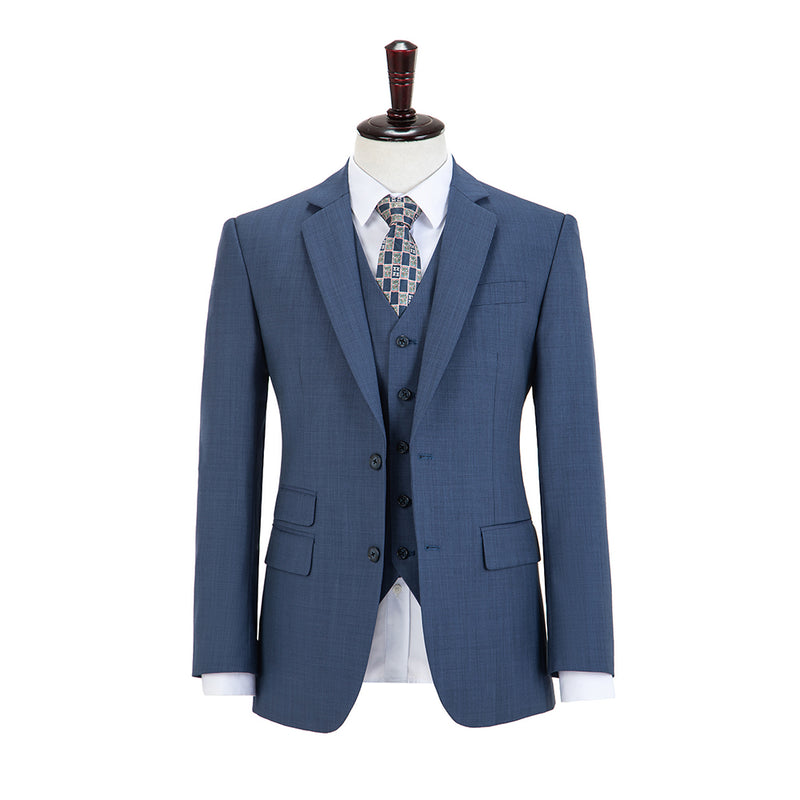The moment I put on my suit, I found my battlefield

A suit is never an ordinary piece of clothing. It is the armor of a workplace person, the flag on the negotiation table, and the silent declaration in the urban jungle. When I buttoned up my shirt cuffs and smoothed out the wrinkles on my tie, the figure reflected in the mirror seemed to remind me: from this moment on, you are no longer a bystander, but a warrior.

The year I graduated from college, I squeezed into the subway wearing a loose sweater and canvas shoes. Like all young people who had just entered society, I thought that the workplace was the glamorous office building in TV dramas. It was not until I was rejected in the first interview that the HR said tactfully: "Maybe you can dress more formally."
It was then that I realized that a suit is not only a dress code, but also an invisible threshold. It is like a touchstone, clearly distinguishing "student thinking" from "workplace rules". I began to observe people wearing suits in the subway: they were either walking fast with briefcases or typing on keyboards in the corners of coffee shops. Behind the backs of the suits and leather shoes, there were countless unspoken battlefields - verbal battles in the conference room, lonely lights under the overtime lights late at night, and undercurrents when customers signed contracts.
Suits are silent tickets to the adult world.


I really owned my first suit in the third month after joining the company. That day, I stood in the fitting room, and my breathing suddenly became rapid when the dark gray fabric fit my shoulder line. When the tailor used a pin to adjust the waist, he said: "Young man, whether the suit fits or not depends on the shoulders." This sentence was like a spell, which made me suddenly understand: a suit is not a piece of cloth to cover the body, but a tool to reshape myself.
For the first meeting in a suit, I arrived at the company two hours in advance and repeatedly practiced the strength of handshakes and the arc of smiles. As my colleagues entered the meeting room one after another, I heard my heart beating like a drum, but the touch of the lining of my suit was like a tranquilizer - it reminded me that the tension at this moment was not cowardice, but the adrenaline of a soldier before going to war.
The project proposal I led that day was approved. When the meeting ended, my boss patted me on the shoulder and said, "You seem like a different person today." I looked down at my cuffs and suddenly realized: the suit never gave me power, it just made me see the edge I already had.

The first lesson that the suit taught me was "accept imperfection."
When I first wore a suit, I was always anxious about the crooked tie and wrinkled trouser legs. Until an important negotiation, I found that the cuffs of the director's suit were stained with coffee, but he still signed the contract calmly. At that moment, I suddenly realized: what really matters is not whether the clothes are straight, but whether the person wearing the clothes can straighten his spine.
The suit also taught me to "hide the edge."
I used to think that suits were sharp weapons, but later I realized that true professionalism is often hidden in the details - whether the cufflinks are reflective, how to fold the pocket square, and whether the shoe surface is spotless. These tiny details are not vanity, but awe of the battlefield. Just like a samurai wiping his sword and a suit craftsman ironing the cloth, they are essentially projections of self-requirements.


After wearing suits for five years, I quit my job and started my own business. When I took off my company uniform for the last time, I felt a little reluctant when I touched the rough edges of the cuffs. My friends laughed at me for "getting too deep into the play", but I knew: suits are no longer battle robes, but the coordinates of the battlefield.
Now I wear custom suits to meet investors, and I also wear jeans to pack goods in the warehouse. Suits are no longer a symbol of status, but a metaphor for the right to choose - when you can switch freely between T-shirts and suits, you really have the initiative in your life.
But whenever I need to be "fully armed", I will still solemnly fasten my cufflinks. Because I know that a true warrior is never afraid of the battlefield, but is afraid of forgetting why he is fighting.

This era always defines success: a million-dollar annual salary is a battlefield, and the IPO bell is a battlefield, but what the suit taught me is that everyone can find their own battlefield. It may be in front of the floor-to-ceiling window of the CBD, or on a round table in a community cafe; it may be wearing a three-piece suit, or it may be wearing a hooded sweatshirt.
The important thing is that when you put on that "battle suit", can you hear the voice in your heart:
"Yes, I'm ready."


